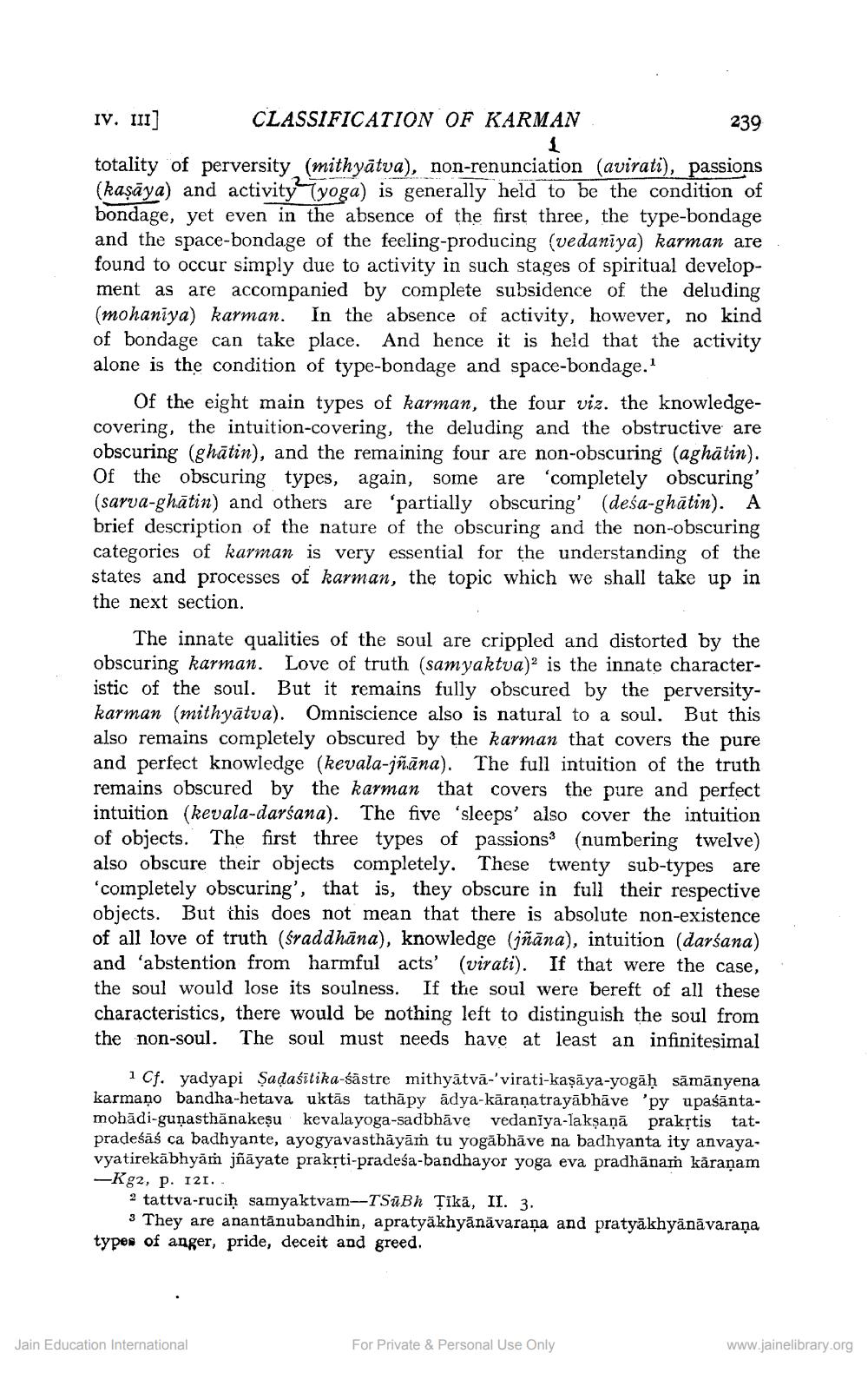________________
IV. III]
CLASSIFICATION OF KARMAN
239
totality of perversity (mith yātva), non-renunciation (avirati), passions (kaşāya) and activity Tyoga) is generally held to be the condition of bondage, yet even in the absence of the first three, the type-bondage and the space-bondage of the feeling-producing (vedaniya) karman are, found to occur simply due to activity in such stages of spiritual development as are accompanied by complete subsidence of the deluding (mohaniya) karman. In the absence of activity, however, no kind of bondage can take place. And hence it is held that the activity alone is the condition of type-bondage and space-bondage.!
Of the eight main types of karman, the four viz. the knowledgecovering, the intuition-covering, the deluding and the obstructive are obscuring (ghātin), and the remaining four are non-obscuring (aghātin). Of the obscuring types, again, some are completely obscuring' (sarva-ghātin) and others are 'partially obscuring' (deśa-ghātin). A brief description of the nature of the obscuring and the non-obscuring categories of karman is very essential for the understanding of the states and processes of karman, the topic which we shall take up in the next section.
The innate qualities of the soul are crippled and distorted by the obscuring karman. Love of truth (samyaktua) is the innate characteristic of the soul. But it remains fully obscured by the perversitykarman (mithyātva). Omniscience also is natural to a soul. But this also remains completely obscured by the karman that covers the pure and perfect knowledge (kevala-jñāna). The full intuition of the truth remains obscured by the karman that covers the pure and perfect intuition (kevala-darśana). The five 'sleeps' also cover the intuition of objects. The first three types of passions (numbering twelve) also obscure their objects completely. These twenty sub-types are 'completely obscuring', that is, they obscure in full their respective objects. But this does not mean that there is absolute non-existence of all love of truth (śraddhāna), knowledge (jñāna), intuition (darśana) and 'abstention from harmful acts' (virati). If that were the case, the soul would lose its soulness. If the soul were bereft of all these characteristics, there would be nothing left to distinguish the soul from the non-soul. The soul must needs have at least an infinitesimal
1 Cf. yadyapi Şadaśitika-śāstre mithyātvā-'virati-kaşāya-yogāḥ sämänyena karmaņo bandha-hetava uktās tathāpy ādya-käraṇatrayābhāve 'py upaśāntamohādi-gunasthänakeşu kevala yoga-sadbhāve vedaniya-lakşaņā prakstis tatpradeśāś ca badhyante, ayogyavasthāyām tu yogābhāve na badhyanta ity anvayavyatirekäbhyam jñāyate prakrti-pradeśa-bandhayor yoga eva pradhanam kāraṇam -Kg2, p. 121..
2 tattva-rucih samyaktvam--TSūBh Tikā, II. 3.
3 They are anantānubandhin, apratyakhyānāvarana and pratyākhyänāvaraņa types of anger, pride, deceit and greed.
Jain Education International
For Private & Personal Use Only
www.jainelibrary.org




